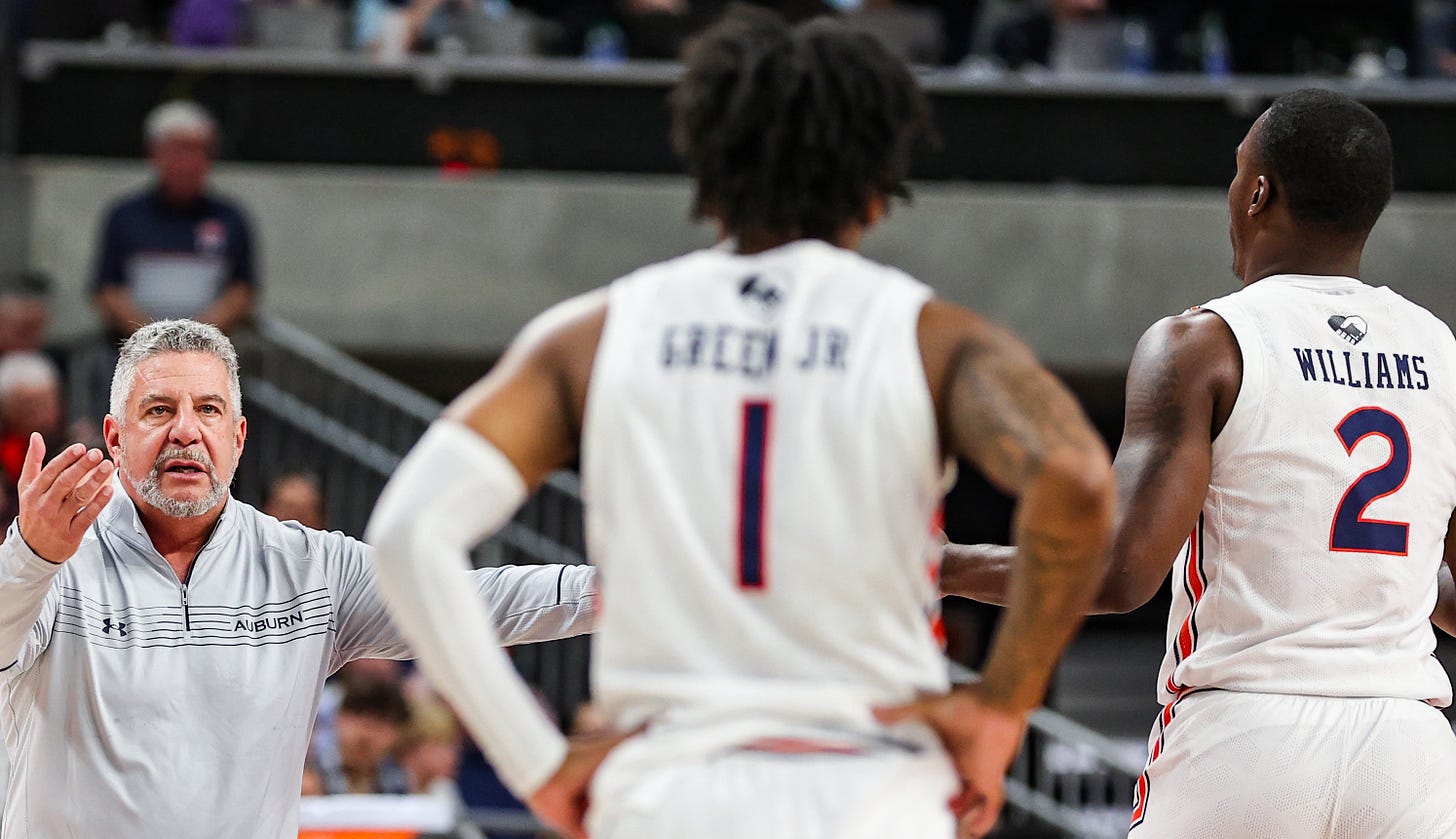Why has Auburn basketball gotten off to slower offensive starts recently?
In the last nine games, the Tigers have scored more than 16 points inside the first 10 minutes just twice. Can they fix it in time for the postseason?
(Jacob Taylor/Auburn Athletics)
When a college basketball team has won 24 games and only lost three by a combined 11 points, there’s only so much you can realistically nitpick.
But there’s a recent trend that Bruce Pearl’s Auburn basketball team is trying to overcome entering the final two weeks of the regular season.
Auburn, the team that ranks No. 2 in the SEC in offensive efficiency during conference games and No. 16 nationally, has had a hard time getting off to fast starts on offense.
“We always end up trying to fight back, but we got to figure out how to start better… I feel like that will help us late,” Jabari Smith said last Saturday.
Unlike Auburn’s mostly cold spell from beyond the arc — more on that later — this trend started before the rock fight at Missouri. In fact, it came in Auburn’s biggest win of the season, an 80-71 home victory over a Kentucky team that is close behind in the race for the SEC title and a potential No. 1 seed in the NCAA Tournament.
During that game, Auburn grabbed an early lead but surrendered a 13-0 run to go down by 10 less than six minutes into the game. The Tigers responded to pull within a single possession by the midway point of the first half, but they still only had 16 points at the end of the “first quarter,” so to speak.
(Men’s college basketball should really switch to quarters like every other organized league on the planet, including the women’s college game.)
Keep 16 in mind. It’s not a terrible number, but it’s below the standard the Tigers set for themselves on offense earlier in the season.
Auburn has scored 16 or fewer first-quarter points in seven of its last nine games. It only did that three times in its first 18.
During its first six SEC games, Auburn scored 18 or more points in the first 10 minutes each time. The Tigers averaged 20.7 “first-quarter” points during that stretch, and their scoring differential during those five 10-minute periods was +40.
In non-conference play — excluding the mid-SEC schedule Oklahoma game — Auburn averaged 18.5 first-quarter points and had a scoring differential of +60 across those 12 games. Add that with the first six SEC games, and Auburn averaged an even 19.5 first-quarter points and had a scoring differential of +100.
Things have changed since the slow start against Kentucky. Over their last nine contests, the Tigers are averaging just 15.8 points per first quarter, and their combined scoring differential during those quarters is just +9.
Only two of those nine games — the home win over Alabama and the road win at Georgia — have featured scoring outputs of more than 16 in the first quarter. The Tigers scored 21 each in the two games and led by five and 10 at the midway point of the first half, respectively.
Those have been overshadowed by the rougher offensive efforts. Auburn scored just 11 points in the first 10 minutes of its road loss at Arkansas, shooting 4-13 from the field in what was ultimately a 6-28 start.
In its other SEC loss, last Saturday against Florida, Auburn scored 12 points in the first 10 minutes and went 5-18 from the floor. The Tigers missed eight straight shots at one point and had a rash of non-steal turnovers.
And this isn’t just a road game problem, either. The Tigers had 14 points in the first quarter against Texas A&M and shot 5-17 from the field. (There was a six-miss streak during that stretch.) If it wasn’t for elite defense from Walker Kessler and the rest of the lineup, Auburn could have easily found itself in another early hole.
A few nights later against Vanderbilt, Auburn opened the game 5-15 from the floor and scored 16 points, trailing a hot Commodores offense early. Even in their home arena, the Tigers are still prone to the slow offensive starts.
The shift to lower-scoring first quarters could be chalked up to tougher defenses — Kentucky and Arkansas being the chief among them.
But Auburn was starting much better on offense during a stretch that included LSU, the nation’s No. 3 defense in terms of efficiency. The Tigers also scored 24 first-quarter points in their home matchup against Florida — the same defense that allowed just 12 last Saturday.
And Pearl is pointing the finger at himself and his own team, rather than his opponents, when it comes to the slow starts.
Keep reading with a 7-day free trial
Subscribe to The Auburn Observer to keep reading this post and get 7 days of free access to the full post archives.


